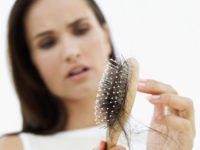It's true that men are more likely to lose their hair than women, mostly due to male pattern baldness (more on that later).
But thinning hair and hair loss are also common in women, and no less demoralizing. Reasons can range from the simple and temporary—a vitamin deficiency—to the more complex, like an underlying health condition.
In many cases, there are ways to treat both male and female hair loss. It all depends on the cause. Here are some common and not-so-common reasons why you might be seeing less hair on your head.
Physical stress
Any kind of physical trauma—surgery, a car accident, or a severe illness, even the flu—can cause temporary hair loss. This can trigger a type of hair loss called telogen effluvium. Hair has a programmed life cycle: a growth phase, rest phase and shedding phase. When you have a really stressful event, it can shock the hair cycle, (pushing) more hair into the shedding phase. Hair loss often becomes noticeable three-to-six months after the trauma.
Pregnancy
Pregnancy is one example of the type of physical stress that can cause hair loss (that and hormones). Pregnancy-related hair loss is seen more commonly after your baby has been delivered rather than actually during pregnancy
If you do experience hair loss, rest assured that your hair will grow back in a couple of months. It’s a normal thing and it will work its way out.
Too much vitamin A
Overdoing vitamin A-containing supplements or medications can trigger hair loss. The Daily Value for vitamin A is 5,000 International Units (IU) per day for adults and kids over age 4; supplements can contain 2,500 to 10,000 IU.
Lack of protein
If you don't get enough protein in your diet, your body may ration protein by shutting down hair growth. This can happen about two to three months after a drop in protein intake.
Male pattern baldness
About two out of three men experience hair loss by age 60, and most of the time it's due to male pattern baldness. This type of hair loss, caused by a combo of genes and male sex hormones, usually follows a classic pattern in which the hair recedes at the temples, leaving an M-shaped hairline.
Heredity
Female-pattern hair loss, called androgenic or androgenetic alopecia, is basically the female version of male pattern baldness. If you come from a family where women started to have hair loss at a certain age, then you might be more prone to it. Unlike men, women don't tend to have a receding hairline, instead their part may widen and they may have noticeable thinning of hair.
Female hormones
Just as pregnancy hormone changes can cause hair loss, so can switching or going off birth-control pills. This can also cause telogen effluvium, and it may be more likely if you have a family history of hair loss. The change in the hormonal balance that occurs at menopause may also have the same result. The androgen (male hormone receptors on the scalp becoming activated, the hair follicles will miniaturize and then you start to lose more hair. If a new Rx is a problem, switch back or talk to your doctor about other birth control types. Stopping oral contraceptives can also sometimes cause hair loss, but this is temporary.
Emotional stress
Emotional stress is less likely to cause hair loss than physical stress, but it can happen, for instance, in the case of divorce, after the death of a loved one, or while caring for an aging parent. More often, though, emotional stress won't actually precipitate the hair loss. It will exacerbate a problem that's already there.
As with hair loss due to physical stress, this shedding will eventually abate. While it's not known if reducing stress can help your hair, it can't hurt either. Take steps to combat stress and anxiety, like getting more exercise, trying talk therapy, or getting more support if you need it.
Anemia
Almost one in 10 women aged 20 through 49 suffers from anemia due to an iron deficiency (the most common type of anemia), which is an easily fixable cause of hair loss. You doctor will have to do a blood test to determine for sure if you have this type of anemia.
A simple iron supplement should correct the problem. In addition to hair loss, other symptoms of anemia include fatigue, headache, dizziness, pale skin, and cold hands and feet.
Hypothyroidism
Hypothyroidism is the medical term for having an underactive. This little gland located in your neck produces hormones that are critical to metabolism as well as growth and development and, when it’s not pumping out enough hormones, can contribute to hair loss. Your doctor can do tests to determine the real cause
Synthetic thyroid medication will take care of the problem. Once your thyroid levels return to normal, so should your hair
Vitamin B deficiency
Although relatively uncommon in the U.S., low levels of vitamin B are another correctable cause of hair loss.
Like anemia, simple supplementation should help the problem. So can dietary changes. Find natural vitamin B in fish, meat, starchy vegetables, and non-citrus fruits. As always, eating a balanced diet plentiful in fruits and vegetables as well as lean protein and “good” fats such as avocado and nuts will be good for your hair and your overall health.
Autoimmune-related hair loss
This is also called alopecia areata and basically is a result of an overactive immune system. The body gets confused, the immune system sees the hair as foreign and targets it by mistake.
Steroid injections are the first line of treatment for alopecia areata, which appears as hair loss in round patches on the head. The course of the condition can be unpredictable, with hair growing back then falling out again.
Lupus
Other autoimmune diseases such as lupus can also cause hair loss. Again it’s a case of mistaken identity: overzealous immune cells attack the hair. Unfortunately, hair loss of this type is “scarring,” meaning the hair will not grow back.
Dramatic weight loss
Sudden weight loss is a form of physical trauma that can result in thinning hair. This could happen even if the weight loss is ultimately good for you. It’s possible that the weight loss itself is stressing your body or that not eating right can result in vitamin or mineral deficiencies. Loss of hair along with noticeable weight loss may also be a sign of an eating disorder such as anorexia or bulimia.
Sudden weight loss seems to shock the system and you’ll have a six-month period of hair loss and then it corrects itself.
Chemotherapy
Some of the drugs used to beat back cancer unfortunately can also cause your hair to fall out. It destroys rapidly dividing cells. That means cancer cells, but also rapidly dividing cells like hair.
Once chemotherapy is stopped, your hair will grow back although often it will come back with a different texture (perhaps curly when before it was straight) or a different color. Researchers are working on more targeted drugs to treat cancer, ones that would bypass this and other side effects.
Polycystic ovary syndrome
Polycystic ovary syndrome (PCOS) is another imbalance in male and female sex hormones. An excess of androgens can lead to ovarian cysts, weight gain, a higher risk of diabetes, changes in your menstrual period, infertility, as well as hair thinning. Because male hormones are overrepresented in PCOS, women may also experience more hair on the face and body.
Treating PCOS can correct the hormone imbalance and help reverse some of these changes. Treatments include diet, exercise, and potentially birth control pills, as well as specific treatment to address infertility or diabetes risk.
Antidepressants, blood thinners, and more
Certain other classes of medication may also promote hair loss. More common among them are certain blood thinners and the blood-pressure drugs known as beta-blockers. Other drugs that might cause hair loss include methotrexate (used to treat rheumatic conditions and some skin conditions), lithium (for bipolar disorder), nonsteroidal anti-inflammatory drugs (NSAIDs) including ibuprofen, and possibly antidepressants.
If your doctor determines that one or more of your medications is causing hair loss, talk with him or her about either lowering the dose or switching to another medicine.
Overstyling
Vigorous styling and hair treatments over the years can cause your hair to fall out. Examples of extreme styling include tight braids, hair weaves or corn rows as well as chemical relaxers to straighten your hair, hot-oil treatments or any kind of harsh chemical or high heat. Because these practices can actually affect the hair root, your hair might not grow back.
In addition to avoiding these styles and treatments, using conditioner after every shampoo, letting your hair air dry, limiting the amount of time the curling iron comes in contact with your hair and using heat-driven products no more than once a week.
Trichotillomania
Trichotillomania, classified as an “impulse control disorder,” causes people to compulsively pull their hair out. It’s sort of like a tic, the person is constantly playing and pulling their hair. Unfortunately, this constant playing and pulling can actually strip your head of its natural protection: hair. Trichotillomania often begins before the age of 17 and is four times as common in women as in men.
Some antidepressants may be effective, but behavioral modification therapy is another option.
Aging
It’s not uncommon to see hair loss or thinning of the hair in women as they enter their 50s and 60s. Experts aren’t sure why this happens.
There are also plenty of tricks to prevent hair breakage and ways to keep your hair looking shiny and healthy in your 50s and above.
Anabolic steroids
If you take anabolic steroids—the type abused by some athletes to bulk up muscle—you could lose your hair. Anabolic steroids can have the same impact on the body as polycystic ovary disease (PCOS), as the mechanism is the same.
This should improve after going off the drug.
Hair Growth Rejuvenation Botanical Shampoo by Botanical Green Care specifically developed to reduce hair loss and stimulate hair growth by promoting additional blood circulation to the scalp, strengthening and encouraging hair follicles to remain in their growth phase.








